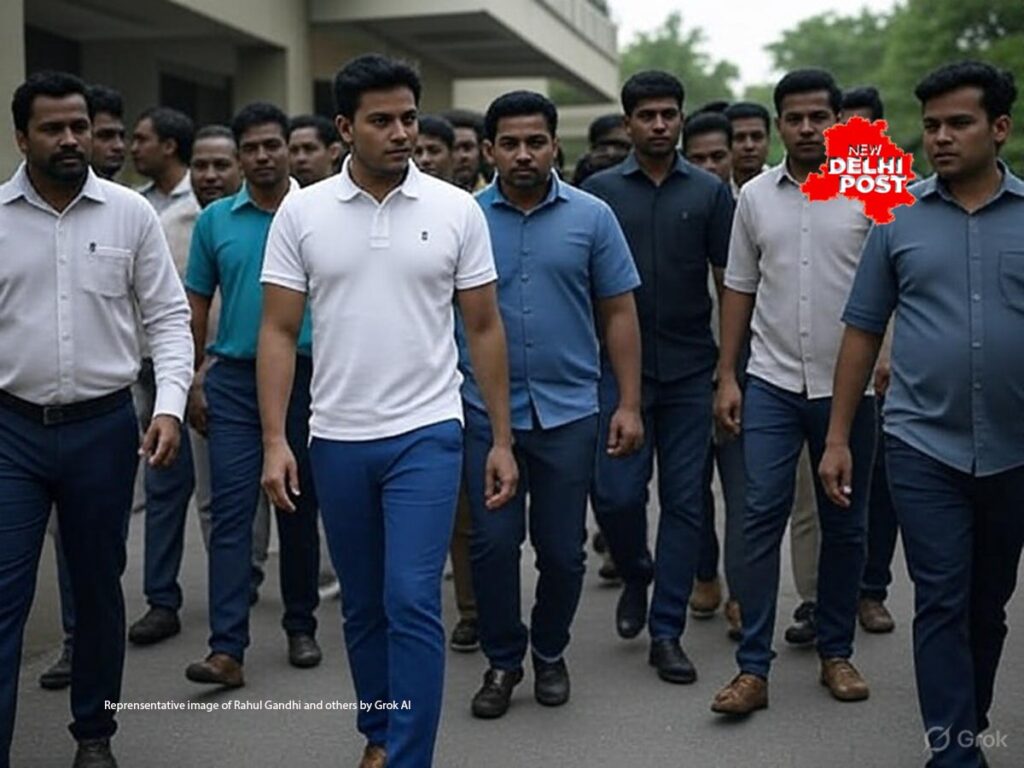Speaking at a rally in Rajgir, Rahul Gandhi accuses the Modi government of lacking sincerity in conducting a caste census, alleging it prioritizes corporate interests over social justice for marginalized communities.
Rajgir, Bihar: On June 6, 2025, Congress MP and Leader of Opposition in the Lok Sabha, Rahul Gandhi, addressed a gathering at the Samvidhan Suraksha Sammelan in Rajgir, Bihar, where he reiterated his demand for a nationwide caste census. He accused the Modi government of being insincere in its commitment to the exercise, claiming it would not conduct a “genuine” caste census that truly addresses the needs of marginalized communities.
Doubts Over Government’s Intent
Rahul Gandhi expressed skepticism about the Modi government’s announcement of a caste census, calling it a superficial move. “In the Lok Sabha, I told Modi ji face-to-face that a caste census will happen, and you know he has a habit of surrendering,” Gandhi said, referring to the government’s decision earlier this year to include caste enumeration in the upcoming national census. However, he cautioned that the BJP-led government would not conduct an authentic census, alleging it was more focused on protecting corporate interests. “Why aren’t there Dalit or extremely backward CEOs in multinational companies? The system is designed to exclude 90% of the population,” he remarked, highlighting the lack of representation for OBCs, Dalits, and tribals in key sectors.
A Call for Social Justice
Gandhi emphasized that a caste census is crucial for ensuring social justice and equitable development. He pointed to the Telangana model as a blueprint for a transparent and detailed survey, contrasting it with what he called a “fake” caste census conducted in Bihar in 2023 under Nitish Kumar’s government. “The BJP will never conduct a real caste census because it exposes the truth of inequality they want to hide,” he asserted. Gandhi also criticized Prime Minister Narendra Modi’s shifting stance on caste, noting that Modi once claimed to belong to an OBC caste but later denied the relevance of caste after the census announcement.
Systemic Exclusion of Marginalized Groups
The Congress leader underscored the systemic exclusion of marginalized communities, stating that 90% of India’s population—comprising Dalits, OBCs, tribals, and minorities—lacks participation in governance, corporate sectors, media, and education. “Out of 90 secretaries in the central government, only three are OBCs, managing just 5% of the budget,” Gandhi claimed, echoing his long-standing argument that a caste census is essential to reveal and address such disparities. He also renewed his demand for removing the 50% cap on reservations and implementing quotas in private educational institutions under Article 15(5), a law he insists must be enforced.
Political Strategy Ahead of Bihar Polls
Gandhi’s remarks come ahead of the Bihar Assembly elections later this year, a state where caste dynamics play a pivotal role in politics. He accused the Modi government of using the caste census announcement as a political tool to counter the opposition’s narrative, a strategy he claims will fail. “The people of Bihar are revolutionary. Change in India often starts here, and you are the catalyst,” he told the crowd, urging Congress workers and INDIA bloc allies to unite against the BJP and RSS. Gandhi’s focus on caste census aligns with the opposition’s broader social justice agenda, which gained traction after the 2024 Lok Sabha polls, where the Congress-SP alliance outperformed the BJP in Uttar Pradesh.
Broader Vision for Empowerment
Beyond the caste census, Gandhi outlined a vision for systemic change, including economic and institutional surveys to understand wealth distribution and participation of marginalized groups. “A caste census is like an X-ray of the nation—it reveals the real issues so we can provide targeted solutions,” he said. He also criticized the Modi government for prioritizing the interests of industrialists like Ambani and Adani, alleging that the system works for only 5% of the population while sidelining Dalits, OBCs, and tribals.
Criticism of Local Administration
Gandhi also recounted challenges faced during his visits in Bihar, claiming the local administration often tries to obstruct his events. He recalled an incident in Darbhanga on May 15, 2025, where his car was stopped, but he reached the venue on foot through back routes. “They can’t stop me because I have your power behind me,” he told the audience, reinforcing his connection with the youth and marginalized communities in the state.
A History of Advocacy
Rahul Gandhi has been a vocal advocate for a caste census for over two years, making it a cornerstone of the Congress party’s social justice agenda. His campaign began gaining momentum in April 2023 with the slogan “jitni aabadi, utna haq” (rights proportional to population), a stance that pressured the Modi government to announce the census in April 2025. However, Gandhi and the Congress remain cautious, warning that the government’s move might be mere optics, similar to the Women’s Reservation Bill, which lacks a clear implementation timeline.
What Lies Ahead?
As the Bihar elections approach, Gandhi’s push for a caste census and broader social justice reforms aims to mobilize OBCs, Dalits, and other marginalized groups, who form a significant voting bloc in the state. Political analysts suggest that while the BJP’s announcement of a caste census may have diluted the opposition’s narrative, Gandhi’s focus on implementation and systemic change could resonate with voters if the government fails to deliver a transparent and effective census.


